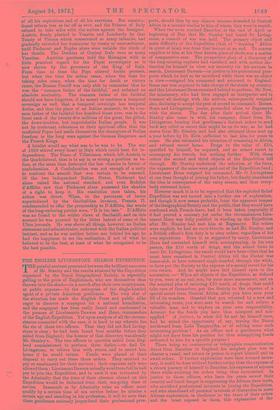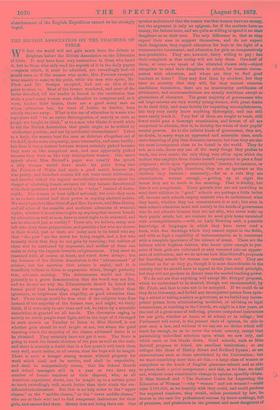THE ENGLISH LIVINGSTONE SEARCH EXPEDITION.
THE painful contrast presented between the brilliant successes of Mr. Stanley and the results attained by the Expedition organised by the Royal Geographical Society, is especially galling to the pride of Englishmen, who see themselves thus thrown into the shade—in a search after their own countryman, at public expense—by the enterprise of the single-handed agent of a private American gentleman. The very slur of the situation has made the English Press and public alike eager to discover a scapegoat for a national humiliation, and the scapegoat has been easily found and condemned in the persons of Lieutenants Dawson and Henn, commanders of the English Expedition. Yet upon analysis of all the circum- stances connected with the case, it is hard to say wherein lies the sin of these two officers. That they did not find Living- stone is clear ; he had been found four months before they sailed from England; the honour of that discovery was already Mr. Stanley's. The two officers in question sailed from Eng- land commissioned to perform three duties,—to find Dr. Livingstone, to relieve him with stores, and to escort him home if he would return. Funds were placed at their disposal to carry out these three orders. They received no pay or emolument for their services ; their expenses only were allowed them; Lieutenant Dawson actually went from full to half pay to join the Expedition, and to each it was intimated by the Admiralty that the time of their absence abroad on this Expedition would be deducted from their sea-going time of service. Inasmuch as by Admiralty rules an officer must qualify by a certain time of sea service before he attains a certain age and standing in his profession, it will be seen that these gentlemen seriously jeopardised their professional pros-
pects, should they by any chance become stranded in Central Afnca in a manner similar to him of whom they were in search. When the news reached Zanzibar, at the end of April or beginning of May, that Mr. Stanley had found Dr. Living- stone, a council of war was held. The primary object and main difficulty of the Expedition (that of " drawing " Africa in quest of him) was from that instant at an end. To convey supplies to him at his then known place of abode was a matter of comparative ease. The prospective glory of a discovery of the long-missing explorer had vanished, and with neither dis- tinction for himself in view, nor necessity for his services in search, Lieutenant Dawson—in justice to his professional pros- pects which he had so far sacrificed while there was an object in view—resigned his command and returned to England. Some one was required to take charge of the stores up country, and this Lieutenant Henn remained behind to perform. Mr. New, the missionary, who had been engaged as interpreter and to transact all dealings with the natives, subsequently resigned also, declining to accept the post of second in command. Messrs. Henn and Livingstone, junior, proceeded alone to Bagamoyo
with the stores. The day after their arrival there Mr. Stanley also came in with his company, direct from Dr. Livingstone, bearing that gentleman's distinct orders to send back any relief or escort that might be on its way, as he had stores from Mr. Stanley, and had also obtained those sent up a year before by Dr. Kirk, sufficient to last him for years to come. He also intimated his intention of remaining in Africa, and refused escort home. Drugs to the value of .£10, specified by himself, he required, and an armed escort to accompany his travels, but nothing further. With these orders the second and third objects of the Expedition fell through. Mr. Stanley undertook the selection of the force, the expenses of the same were paid out of the Expedition fund ; Lieutenant Henn resigned his command, Mr. 0. Livingstone at one time thought of joining his father, but finally abandoned the idea in consequence of the rainy season, and thus every- body returned home.
However much it is to be regretted that the exploded Relief Expedition was not turned into a further one of exploration, and though it now seems probable, from the apparent temper of the Geographical Society and the public, that they would have condoned such French-leave, had it been taken (especially if it had proved a success), yet under the circumstances Lieu- tenant Henn was fully justified in winding up the Expedition after Mr. Stanley had met him at Bagamoyo. His orders were explicit, he had no carte blanche, as had Mr. Stanley, and a British officer's first duty is to obey orders, regardless of his own a:spirations. Even if, as suggested by many, Lieutenant Henn had contented himself with accompanying, in his own person, the flO worth of drugs, and the armed force to meet Dr. Livingstone, the result would have been either that he must have remained in Central Africa till the Doctor was home-sick, or have returned single-handed through the wilds, or have put the Society to the expense of a special escort for his own return. And he might have laid himself open to the accusation :—" When all objects of the Expedition, as defined to you, were at an end, you, for your mere amusement, and on the nominal plea of escorting 10 worth of drugs, that could take care of themselves, put the Society to the expense of a special escort from Central Africa, after you have seen your fill of its wonders. Granted that you returned by a new and interesting route, you were sent to search for and relieve a valuable man, not to explore on your own responsibility. Account for the funds you have thus misspent and mis- applied." A fortiori, to what did he not lay himself open, had he seized the opportunity of, say, tracing the Rusizi northward from Lake Tanganyika, or of solving some such interesting problem ? As an officer and a gentleman, what might not have been his position for thus misapplying funds entrusted to him for a specific purpose ?
There being no commercial or telegraphic communication direct from Zanzibar to England, his simplest plan was to charter a vessel, and return in person to report himself and to await orders. If further exploration were then deemed neces- sary, it could be done without further outlay than the expense of a return journey of himself to Zanzibar, his expenses of sojourn there while awaiting for orders being thus economised. In justice to these officers, who have for years served their country and faced danger in suppressing the African slave trade, who sacrificed professional interests in joining the Expedition, and who abandoned all personal interests of distinction in mere African exploration, in obedience to the tenor of their orders and the trust reposed in them, this explanation of the abandonment of the English Expedition cannot be too strongly urged.



































 Previous page
Previous page